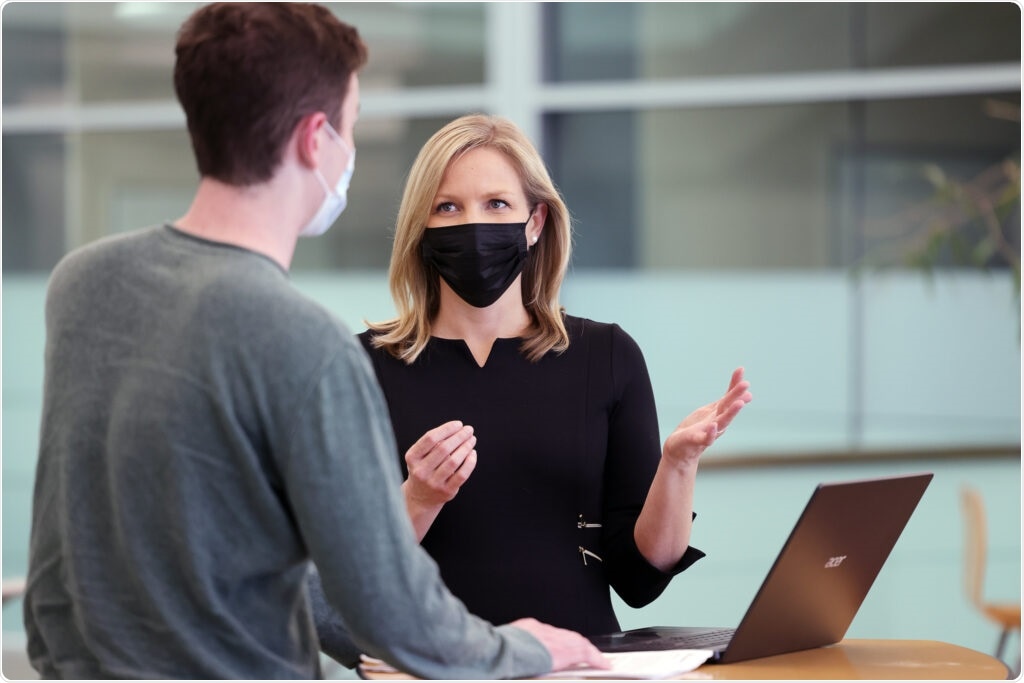According to a new study headed by University of Michigan researchers, genetics serve a vital role in the way human bodies respond to vaccinations and booster shots, proposing that some protective reactions provoked by vaccination could be more powerful with personalization.

Kelly Arnold, Assistant professor in the Biomedical Engineering Department at the University of Michigan and Biomedical Engineering PhD student Robert Theisen reviewing a project in one of the common spaces of Building 520 of the North Campus Research Complex, at the University. Image credit: Brenda Ahearn.
The team also found a specific form of an antibody-related gene that forecasts, at a population level, whether booster shots to create more antibodies will be successful for enhancing innate immune responses.
What’s most interesting with this work is the concept of personalized variability and understanding direct links between vaccine responses and different genes people have.”
Kelly Arnold, Study Senior Author and Assistant Professor, Biomedical Engineering, University of Michigan
The paper was published in Frontiers in Immunology.
The study investigated how individuals may react differently to traditional boosting, which exposes the immune system again to the virus (or certain portions of it) to improve antibody concentration.
Nevertheless, in some individuals, the improvement in antibody concentration might not make much difference because immune receptors are encoded by their genes that are not as good at attaching to the antibodies—they are believed to have a lower affinity.
Consequently, an individual can have a decent antibody count, while still having a poor immune response. Thus, one theoretical substitute immune-boosting path could be to make vaccines that tweak the antibody structure—making those antibodies more probable to attach to the immune cell receptors of an individual.
Depending on your genetic background, we’ve found that vaccine boosting may be more or less effective in activating certain innate immune functions. And in some people, where boosting the concentrations of antibodies was ineffective, being able to change the affinity of antibodies could be the more successful route. Though this is still a theoretical concept and not yet possible in practice.”
Kelly Arnold, Study Senior Author and Assistant Professor, Biomedical Engineering, University of Michigan
Arnold’s research team, in collaboration with partners in Australia, Thailand, and the United States, designed a computer model to find how different genetic factors impact innate immune responses persuaded by vaccine boosting. It makes use of data and plasma samples acquired by the University of Melbourne from the sole moderately defensive HIV vaccine trial until now.
The plasma samples obtained from trial participants—essentially blood samples minus the red blood cells—showed the amount and type of antibodies produced after vaccination.
“In a mixed population of people, we’ve also shown how one specific genotype would drive whether that population was responsive to changes in antibody concentrations expected from traditional boosting,” adds Arnold.
Modeling showed that different deviations can forecast how functional boosting to upsurge antibody levels will be in a given population, in a gene that encodes for a certain type of antibody (IgG1). Certain populations in the HIV trial revealed that improving antibody levels led to zero change in the inborn immune operations that were being assessed.
What that tells us is that in populations with certain genetic variations, traditional boosting methods to increase antibody concentrations may not be as effective at improving innate immune functions.”
Kelly Arnold, Study Senior Author and Assistant Professor, Biomedical Engineering, University of Michigan
The vaccine ingredients developed to increase the body’s immune response are adjuvants.
Arnold’s team used data from the same experiment to signify why some vaccines impact individuals differently. In the future, both studies result in novel design ideologies for vaccines that take a person’s personalized individualities into consideration.
Source:
Journal reference:
Lemke, M. M., et al., (2022). A Quantitative Approach to Unravel the Role of Host Genetics in IgG-FcγR Complex Formation After Vaccination. Frontiers in Immunology. doi.org/10.3389/fimmu.2022.820148.